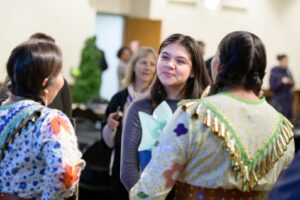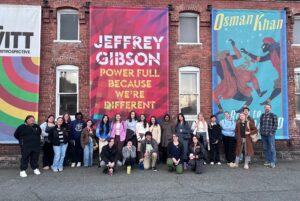Land Acknowledgment
In Fall 2024, the Trinity College Board of Trustees adopted a land acknowledgment. Following its approval, the College began taking meaningful next steps to ensure the acknowledgment represented more than just words—committing to action and deeper engagement.
As a community at Trinity College in Hartford, Connecticut, we acknowledge that we are on the unceded land called Suckiaug, or Black Earth, central to the lives of certain Indigenous peoples. The Connecticut River Valley has been home to Native people for millennia. Trinity College acknowledges the impact of marginalization on the Wangunk, Mahican, Nehantic, Nipmuck, Pequonock, Podunk, Tunxis, and Wappinger peoples, as well as other impacted groups. The Trinity community also honors the sovereignty of our neighbors, the Mashantucket Pequot, Mohegan, Eastern Pequot, Golden Hill Paugussett, and Schaghticoke nations. We commit to continue partnering with the Indigenous communities of Hartford and from across the state.
Mission Statement of the Land Acknowledgment Steering Committee

We aim to build a sustainable framework for supporting Indigenous sovereignty, starting on our campus and strengthening our connections in the city and state, coordinated by the Summit Fellow for Indigenous Community Initiatives and Civic Engagement. We will:
- Implement concrete actions that align with the college land acknowledgment in partnership with faculty, student, and staff organizations.
- Collaborate equitably and reciprocally on programming and initiatives with Connecticut’s federally and state-recognized tribal communities as well as members of Hartford’s diverse Native American and Indigenous communities.
- Communicate through the land acknowledgment website and other channels with the campus community and partners in the city and state about current and future events, ideas, and concrete actions, cultivating a pattern of transparency and two-way communication.
- Connect our campus community to centers of Indigenous leadership, community, and expression by leader-to-leader meetings and by staff, faculty, and student visits.
- Plan with clear priorities and timelines about current and future college commitments, keeping a list of present and future actions to support and make visible Indigenous sovereignty.
PRONUNCIATION GUIDE
| Name | Phonetic Pronunciation | Audio Pronunciation |
| Wangunk | (WON-gunk/ Wane- gunk) | |
| Mahican | (moe-HEE-can) | |
| Nehantic | (Nei-ann-tick) | |
| Nipmuc | (Nip-muck) | |
| Pequonock | (Pee-kwah-nock) | |
| Podunk | (Po-dunk) | |
| Tunxis | (Tunx-is) | |
| Wappinger | (Wap-pin-ger) | |
| Eastern Pequot | (Pea-kwaht) | |
| Golden Hill Paugussett | (paw-GUS-it) | |
| Mashantucket Pequot | (Mash-un-tuck-it Pea-kwaht) | |
| Mohegan |
(Mo-he-gan) | |
| Schaghticoke |
(ska-teh-COKE) |
Working Draft Commitments Beyond a Land Acknowledgment Statement
- Establish a fixed position for an Indigenous Community Initiatives and Civic Engagement staff member.
- Explore Certificate Program, connecting existing courses to co-curricular opportunities, via CHER, CCS, and OMA as well as other existing institutions doing community-based work (e.g. academic credit for planning and participation in the Saukiog (Hartford) Harvest Festival).

November 9, 2024, a group of students and faculty made a trip to MASS MoCA for Jeffery Gibson’s exhibit “POWER FULL BECAUSE WE’RE DIFFERENT”. - Build guidelines for ethical engagement with tribal nations and Indigenous community members.
- Develop a strategy for recruiting and retaining Native American and Indigenous students.
- Establish student organization/s and community space/s that acknowledge/s and promote/s the full inclusion of Indigenous people in the Trinity community.
- Support initiatives with regard to Native languages and crediting such courses and exempting Indigenous speaking students from curricular language requirement.
- Make college budgetary commitments for Year-round public events in addition to events associated with Indigenous Peoples’ Day (early October) and Native American Heritage Month (November), as well as events devoted broadly to reparations movements and other issues relevant to Indigenous communities.
- Develop collaborative curating practices, digital repatriations, and/or other partnerships connecting the Watkinson library to tribal nations and their archives.
- Create campus signage (e.g. display space in the 1823 room and/or on the Long Walk) highlighting the history and presence of Indigenous peoples in Hartford and Connecticut.
- Make available appropriately designed commencement-related event for Native American and Indigenous students who graduate together to celebrate.
- Develop a long-term strategy to support the hiring of faculty in Native American and Indigenous Studies across the curriculum.
Frequently Asked Questions
A land acknowledgment is a formal statement that recognizes the original stewards of the land before colonization and recognizes the relationship that present-day communities have with present and future Indigenous people of that land.
Land acknowledgments are often stated at the beginning of events and other gatherings, whether private or public. They are also often included in written statements or on websites as an indication of the institution’s broad commitments.
A land acknowledgment implies a commitment to reparative actions due to the centuries of displacement and dispossession of Indigenous people. Many land acknowledgments indicate what kind of actions the community is taking. This essay by Elizabeth Ellis and Rose Stremlau gives good look into what comes with just the statement.
In October 2024, the Board of Trustees of Trinity College adopted a land acknowledgment. Additionally, the College is forming a Land Acknowledgment Steering Committee which will collaborate with stakeholders across the Trinity community to develop commitments that strengthen existing partnerships and programs focused on Indigenous communities, as well as to identify new initiatives that engender greater understanding and appreciation for Indigenous communities in Hartford and within our college community.
Campus Resources
External Resources
Links to Tribal Websites
Chenille Jake '24
Williams Memorial - 134
